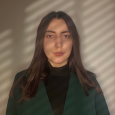In 1961 U.S. President John F. Kennedy said: “Ask not what your country should do for you — ask what you should do for your country.”
It’s a popular quote and I’m aware that it may have become a cliché from frequent and sometimes inappropriate use. Nevertheless. Kennedy was addressing the American people, then almost 200 million strong (now over 300 million). He was addressing a people whose state had been born almost 200 years before.
I was not even eight years old when Kosovo declared independence on February 17, 2008. Like the other citizens of this new state (less than two million), I had the privilege of witnessing its birth. Doesn’t this make what I said above more powerful?
Doesn’t having experienced the birth of a state give life-changing decisions — like deciding to leave home, family, and the country itself — more weight?
The problems in Kosovo, of course, are numerous. After February 17, 2008 comes, eventually, February 18, 2023, an ordinary day. Historical moments fade into everyday life. And we cannot forever be like the actors in the 1982 Albanian movie “The Second November” who sing at the declaration of the Albanian national flag in Vlora on November 28, 1912. Life goes on and our connection with that moment, with the state and with the circumstances that preceded the creation of the state change.
To repeat myself, I am fully aware of the difficulties of living in Kosovo. Poverty has always been an issue. Over 250,000 people left Kosovo between 2013 and 2022. Despite this being an escape of sorts, I’m sure at least half of them cried when they left.
However, these problems, which can be seen as reasons for leaving, should be reasons for staying.
Will I leave Kosovo?
Kosovo suffers from a mess of daily problems. And does it mean that the people who are still staying here are happy with it? Or that they do not experience these problems?
No, I still live here and will do so all my life. I will live with these problems, which I would like to not experience. Above all, I am here to fight these problems.
When looking over a relative’s assignments in second grade out of curiosity, I saw that he got top marks even though there were many mistakes. He had written the words “mollë” (apple) and “derë” (door) without “ë,” while he had mixed up the letters “ç” and “q.” The problem, of course, was with their teacher. Let us not forget that Kosovo’s education system is deeply neglected.
In one of my university assignments as a journalism student, I decided to write a news article about dangerous drugs being sold without prescription. Among other drugs, I managed to buy Lexilium and Diazepam, which are mainly prescribed to treat anxiety, insomnia and tremors. These medications are not recommended to be used or sold without a doctor’s prescription.
It turns out that in our country, if you can’t sleep, you can easily be your own doctor and decide your diagnosis and therapy.
Another time when I was faced with the reality of life in Kosovo was when I wanted to enroll in Master’s studies in a public university. While I studied for several months for the entrance exam, I saw that one of my colleagues was trying to enroll through nepotism. Even though that was a route open to me as well, I was fighting to be accepted on meritocratic grounds. It may sound surprising, but this was my way of fighting for good.
I wasn’t accepted because I didn’t fulfill the criteria — at least, I like to think so.


